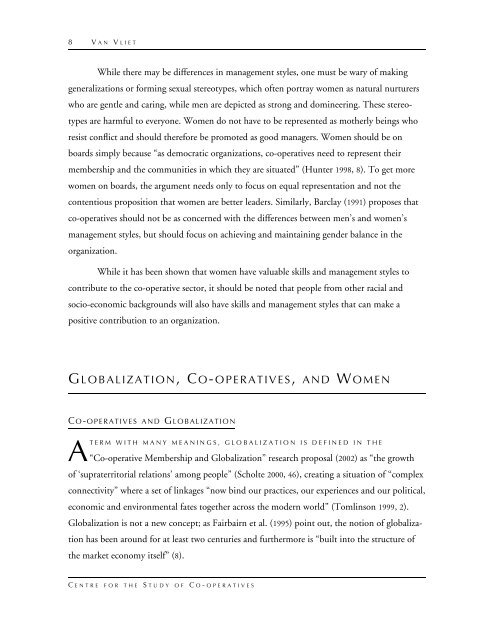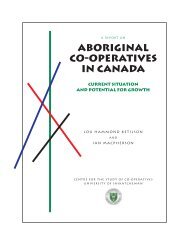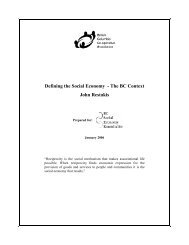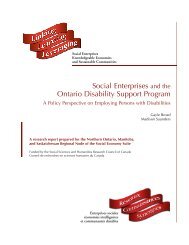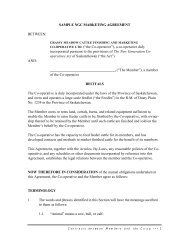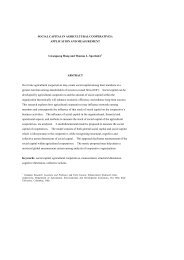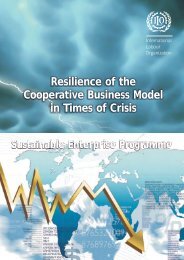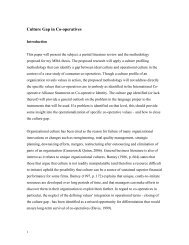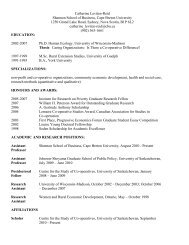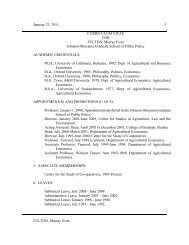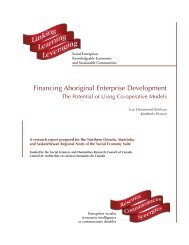Network Diversity - Centre for the Study of Co-operatives
Network Diversity - Centre for the Study of Co-operatives
Network Diversity - Centre for the Study of Co-operatives
You also want an ePaper? Increase the reach of your titles
YUMPU automatically turns print PDFs into web optimized ePapers that Google loves.
8 V A N V L I E T<br />
While <strong>the</strong>re may be differences in management styles, one must be wary <strong>of</strong> making<br />
generalizations or <strong>for</strong>ming sexual stereotypes, which <strong>of</strong>ten portray women as natural nurturers<br />
who are gentle and caring, while men are depicted as strong and domineering. These stereotypes<br />
are harmful to everyone. Women do not have to be represented as mo<strong>the</strong>rly beings who<br />
resist conflict and should <strong>the</strong>re<strong>for</strong>e be promoted as good managers. Women should be on<br />
boards simply because “as democratic organizations, co-<strong>operatives</strong> need to represent <strong>the</strong>ir<br />
membership and <strong>the</strong> communities in which <strong>the</strong>y are situated” (Hunter 1998, 8). To get more<br />
women on boards, <strong>the</strong> argument needs only to focus on equal representation and not <strong>the</strong><br />
contentious proposition that women are better leaders. Similarly, Barclay (1991) proposes that<br />
co-<strong>operatives</strong> should not be as concerned with <strong>the</strong> differences between men’s and women’s<br />
management styles, but should focus on achieving and maintaining gender balance in <strong>the</strong><br />
organization.<br />
While it has been shown that women have valuable skills and management styles to<br />
contribute to <strong>the</strong> co-operative sector, it should be noted that people from o<strong>the</strong>r racial and<br />
socio-economic backgrounds will also have skills and management styles that can make a<br />
positive contribution to an organization.<br />
G L O B A L I Z A T I O N , CO- O P E R A T I V E S , A N D W O M E N<br />
CO-O P E R A T I V E S A N D G L O B A L I Z A T I O N<br />
ATERM WI T H M A N Y M E A N I N G S , G L O B A L I Z A T I O N I S D E F I N E D I N T H E<br />
“<strong>Co</strong>-operative Membership and Globalization” research proposal (2002) as “<strong>the</strong> growth<br />
<strong>of</strong> ‘supraterritorial relations’ among people” (Scholte 2000, 46), creating a situation <strong>of</strong> “complex<br />
connectivity” where a set <strong>of</strong> linkages “now bind our practices, our experiences and our political,<br />
economic and environmental fates toge<strong>the</strong>r across <strong>the</strong> modern world” (Tomlinson 1999, 2).<br />
Globalization is not a new concept; as Fairbairn et al. (1995) point out, <strong>the</strong> notion <strong>of</strong> globalization<br />
has been around <strong>for</strong> at least two centuries and fur<strong>the</strong>rmore is “built into <strong>the</strong> structure <strong>of</strong><br />
<strong>the</strong> market economy itself” (8).<br />
C E N T R E F O R T H E S T U D Y O F C O - O P E R A T I V E S


